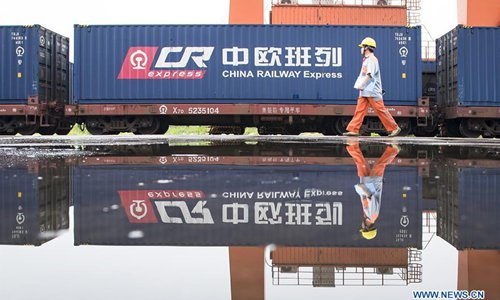Has Europe been naive about its foreign policy toward China for 40 years?
By Liu Zhiqin Source:Global Times Published: 2020/7/5 18:21:31

The freight train X8044 from Hamburg of Germany arrives at Wujiashan railway container center station in Wuhan, central China's Hubei Province, Aug. 26, 2018. As the freight train X8044 arrived in Wuhan, China-Europe freight trains have made 10,000 trips since 2011. (Xinhua/Xiao Yijiu)
Certain European politicians and scholars have been repeatedly using the word "naive" to describe Europe's foreign policies toward China, defining China as a "systemic rival" and claiming that the EU's naive era is over. Such a notion also reveals a trace of helplessness, self-pity and even frustration over its ignorance, with the words between the lines reading Europe's judgment on China has been wrong.
China established diplomatic relations with the European Communities in May 1975. Later in 1978, China and Europe signed a trade agreement, offering each other the most-favored-nation-treatment. The two sides also signed a Trade and Economic Cooperation Agreement in 1985, expanding cooperation to areas such as industry, agriculture, science and technology, energy and others.
The scale of trade between China and Europe surged 250-fold in 40 years, with Europe recorded as China's largest trade partner for 16 consecutive years and China recorded as Europe's second largest trade partner for many years.
The mutually beneficial cooperation in 40 years somehow is now being regarded as regretful mistakes by some people, leading to confusion: Has Europe not harvested profits from China's opening-up by direct investments, purchasing resources and luring talents? Or was there some mysterious purpose other than economic benefits?
The mindset lurking behind the "naivety" notion is that Western countries believed that China would see political revolution in accordance with Western standards when its economy grew and its people got wealthier. Reality didn't follow their wishful expectations. Instead, China has developed steadily on its own path with favorable achievements and without political turmoil. The Western world has started to feel that they have lost power in determining China's future.
China opened up its market to Europe with full sincerity, believing that the honored European guests came to help promote its economic development. However, the naivety notion may have revealed that this was not the European countries' essential purpose.
In fact, the so-called naivety comes from the selfishness of Western politics, that is, the self-righteous belief that the development model they choose must be suitable for all countries and nations with different historical and cultural backgrounds. Taking Chinese and Western cuisine as a reference, each of them has unique characteristics. It is unnecessary to force out all other cuisines and only leave one dish for the world.
China's calls for the establishment of a community with a shared future for mankind by no means implies using the Chinese system in all countries and regions, but instead forming an inclusive world with various entities. It is suggested that the European politicians, upholders of the market-oriented economy, could give some thought to market-oriented politics - letting the political entities, such as citizens, enterprises, parties and capital in each country, decide their politics and develop patterns which are in line with their own interests.
Based on historical experiences in the past century, China's current market-oriented development path was the right and most suitable choice to facilitate its development in the long run.
The European politicians should understand that the values of China and Europe do not stand fully opposed. And European politicians need some new wisdom and an upgrade to their views on different values to continuously promote cooperation between China and Europe, and bring benefits to nearly two billion people from both sides.
The author is a senior research fellow at the Chongyang Institute for Financial Studies of Renmin University of China. bizopinion@globaltimes.com.cn
Posted in: EXPERT ASSESSMENT